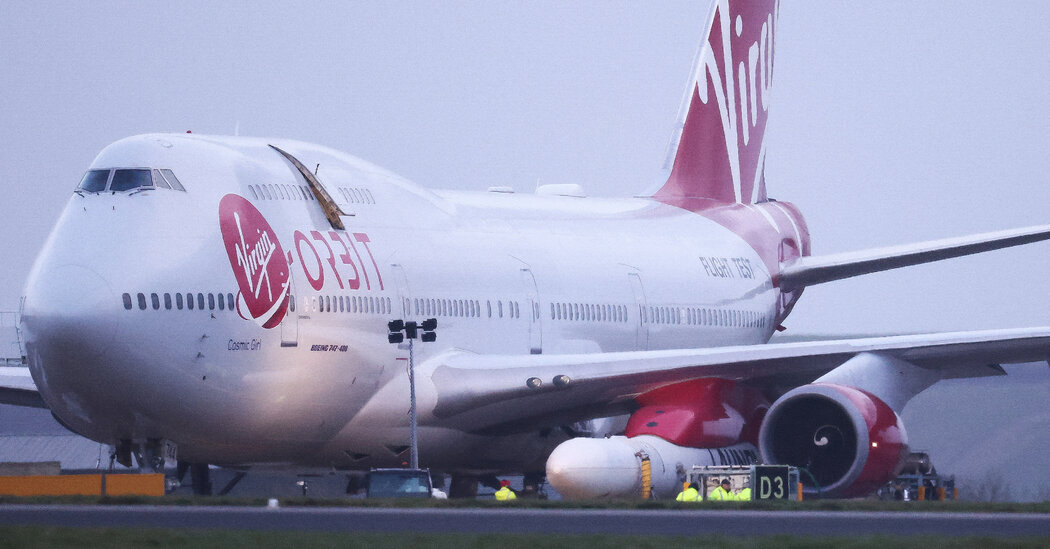

Virgin Orbit, the company that tried to launch satellites into space from Britain for the first time earlier this week, said on Thursday that a problem with the rocket’s second-stage engine about 110 miles above the earth caused the failure of the mission.
Virgin Orbit said in a statement that the problem, which it called an anomaly, “prematurely ended the first burn of the upper stage,” or second stage, of the rocket carrying the satellites. In other words the second-stage engine, which was supposed to lift the satellites high enough to begin orbit, shut down for some reason.
The company said that the rocket and its nine satellites fell to earth within what it called “the approved safety corridor.”
The rocket was launched from Virgin Orbit’s modified Boeing 747 that had taken off from Newquay airport in southwest England late Monday night. The plane and its crew returned safely, but Virgin Orbit clearly has work to do to maintain its business and its reputation.
The company, founded by Richard Branson and based in California, has only a handful of launches in the United States under its belt, but it aspires to establish itself as a global launch provider. The failure of its first international launch is obviously a blow to this effort as well as to Britain’s emerging space program.
Some of the satellites on board belonged to Britain, the United States and other governments, which are unlikely to feel much financial pain from the loss. But for one of the satellite makers, Horizon Technologies, a start-up based in Reading, England, the loss of its device could threaten the company’s existence.
John Beckner, the company’s chief executive, said Horizon had put $4 million into developing the marine intelligence satellite, a tiny device known as a cubesat, for a British government-funded organization, and that “for a company of our size, this loss, if not rectified, could be mortal.”
Mr. Beckner said he was “working with Virgin and the U.K. government in getting compensation for the loss.”
Mr. Beckner also said the company also hoped to launch further versions of the satellite.
When Virgin Orbit will be ready to launch again is unclear. The company said it anticipated returning to Newquay airport for additional launches, but that its next flight would be from its main base, in the Mojave Desert.
It said Jim Sponnick, a space industry veteran, was helping to lead an investigation into the causes of the failure.
24World Media does not take any responsibility of the information you see on this page. The content this page contains is from independent third-party content provider. If you have any concerns regarding the content, please free to write us here: contact@24worldmedia.com

Common Mistakes When Using Athletic Field Tarps

High-Performance Diesel Truck Upgrades You Should Consider

Warehouse Optimization Tips To Improve Performance

Fire Hazards in Daily Life: The Most Common Ignition Sources

Yellowstone’s Wolves: A Debate Over Their Role in the Park’s Ecosystem

Earth Day 2024: A Look at 3 Places Adapting Quickly to Fight Climate Change

Millions of Girls in Africa Will Miss HPV Shots After Merck Production Problem

This Lava Tube in Saudi Arabia Has Been a Human Refuge for 7,000 Years

Four Wild Ways to Save the Koala (That Just Might Work)

National Academy Asks Court to Strip Sackler Name From Endowment

Ways Industrial Copper Helps Energy Production

The Ins and Out of Industrial Conveyor Belts